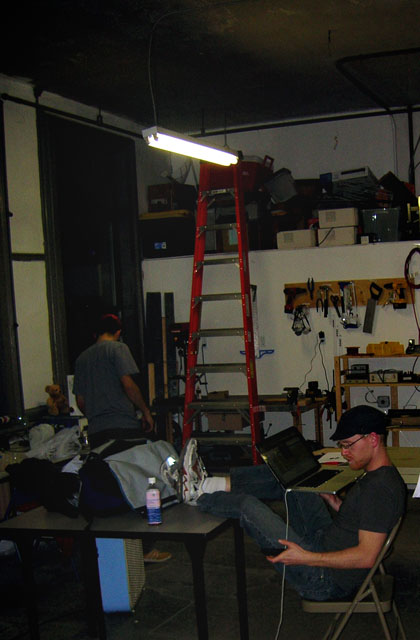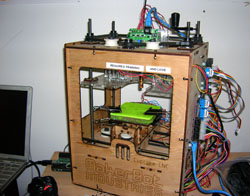
After moving into a new, larger studio down the hall from its original location in the Poplar neighborhood, DIY hacker space Hive 76 is celebrating.
“We had a good year. We were nonexistant to a big space and now we have a huge crew of people,” organizer and “instigator” Far McKon tells Technically Philly.
Founded in March, McKon says that Hive developed organically to 12 full-time members, slowly building with the space’s weekly free-to-all open house, to find itself in its new 40-foot by 30-foot space that is three or four times the size of its previous location.
The group’s weekly events and occasional classes like Jack Zylkin’s upcoming Guitar Effects 101 class compliment its normally laid back atmosphere, witnessed first hand by Technically Philly recently.
We had a chance to sit down with McKon to talk about what the hacker space movement is all about, the group’s innovative MakerBot platform and Hive’s falling out with the Hacktory, after the jump.
What is Hive76?
Hive76 is a second-generation hacker space. It’s a space where people split equipment for making things. There’s people doing software, doing hardware, building physical stuff, props, halloween costumes, everything. It’s a lot like a coworking space or art studio but it’s focused on the hobby end of things a little bit more.
What do you mean by second-generation hacker space?
There was a bunch of hacker spaces started in the 70s and 80s, but they were closed, not open to the public. Then in 2004, a large group went to Europe where they were more open, had a lot more equipment and worked together on projects in coordination. It started this second wave of hacker spaces [in the U.S.]. [Hackerspaces.org has more history and information]
What kind of projects being worked on at Hive?
There’s a couple Mac hackers around right now [on Tuesday evening]; the local iPhone crew just wanted a place to work on projects and solve ideas. Chris is doing Meat Cards, business cards laser cut out of meat, out of here. He wanted to get out of his house and wanted an environment where ideas are bounced around. We also have a lot of the build tools and hardware tools, like MakerBot.

Explain what MakerBot is.
MakerBot is a 3D printing tool that lays down layers of plastic. It’s like a tiny robotic glue gun that builds things layer by layer out of glue. You can design anything digitally, send it to the MakerBot and it willl print out a copy in plastic. [Hive76] is the first place in the world with a heated makerbot platform. As [MakerBot copies] cool, they shrink, so when you print the top, the bottom has already shrunk. But if you heat the base, then the print ends cools more evenly.
How does one get involved with Hive76?
There’s two ways the space gets used. Members have 24/7 access whenever they want. They get a vote in the organization and access as they need it. The second, we have open houses every Wednesday which are free. Individual members can host events or classes here, free or paid. Members get first call [of the space], classes are second-string and free events are third-string.
Hive spun out of the Hacktory. What went down?
The Hacktory is still doing classes, still doing recycling. Hive is about studio space and daily access. Originally, [the Hacktory] was going to have classes and a private access studio. There was some miscommunication and I kind of got booted out [of the Hacktory]. When I left, some other people wanted the studio aspect, so two or three of us already had a studio picked out.
Hacker spaces seem to be a growing trend. What’s the deal?
Groups like this [historically] get in a co-op situation because by themselves it’s harder to do what they believe in or think of. So 3 or 4 guys get something together, a big iron machine, or a lumbering beast of a server, because home computers weren’t powerful enought to do what they wanted. This new generation is more centered on collaborating with people that have different skillsets, and having hardware that you would only use once in a blue moon, like the MakerBot.
Any plans for 2010?
My dream, and I say mine because I don’t want to speak for the other members, is to get a garage in South Philly and have a bigger build space. We’re filing for nonprofit status so we’ll have the ability to look for grants, which also opens up partnership opportunities.
Join the conversation!
Find news, events, jobs and people who share your interests on Technical.ly's open community Slack

Philly daily roundup: Earth Day glossary; Gen AI's energy cost; Biotech incubator in Horsham

Philly daily roundup: Women's health startup wins pitch; $204M for internet access; 'GamingWalls' for sports venues

Philly daily roundup: East Market coworking; Temple's $2.5M engineering donation; WITS spring summit
